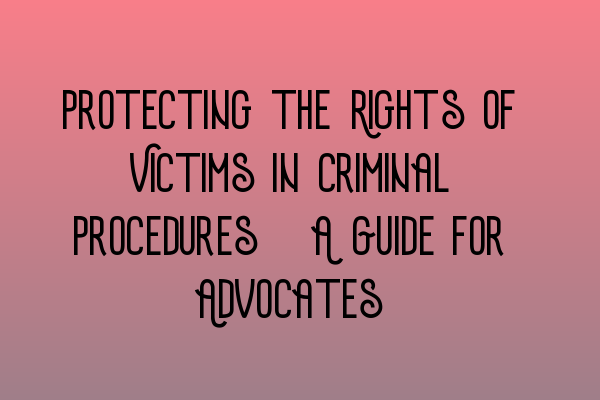Protecting the Rights of Victims in Criminal Procedures: A Guide for Advocates
When it comes to criminal proceedings, the focus is often on the accused and their rights. However, it’s crucial to remember that victims also have rights that must be protected throughout the legal process. As an advocate, it’s your duty to ensure that these rights are upheld and that victims receive the support and justice they deserve.
The Importance of Victim Rights
Victims of crime often face significant emotional, physical, and financial challenges. They may suffer from trauma, fear, and a sense of vulnerability. In such circumstances, it is imperative to prioritize their rights and provide them with the necessary support throughout the criminal procedure.
One key aspect of protecting victims’ rights is providing them with information and updates regarding the progress of their case. Victims have the right to know about the charges, court dates, and any developments that may impact them. By keeping them informed, you can help alleviate their anxiety and empower them to participate fully in the legal process.
Moreover, victims have the right to be treated with dignity, respect, and sensitivity. They should never feel re-victimized or marginalized during court proceedings. As an advocate, it’s your responsibility to ensure that victims are addressed and referred to in a considerate manner by all parties involved.
Supporting Victims Through Legal Resources
To effectively advocate for victims, it’s crucial to be familiar with the available legal resources and support services. By connecting victims with these resources, you can provide them with the necessary assistance and help them navigate the complex criminal justice system.
For instance, victims may benefit from access to victim support organizations, which can provide emotional support, advice, and practical assistance. These organizations can help victims understand their rights, navigate the legal process, and connect with other relevant services, such as counseling or financial support.
Additionally, it’s essential to ensure that victims are aware of their options for legal representation. Providing them with information about pro bono services or legal aid can help empower them and ensure that they have a voice in the proceedings.
Collaboration and Advocacy
Protecting the rights of victims requires collaboration among all parties involved in the criminal justice system. As an advocate, it’s essential to work collaboratively with law enforcement agencies, prosecutors, and victim support organizations to ensure that victims’ rights are respected and upheld.
Advocacy plays a significant role in protecting victims’ rights by raising awareness of their needs and pressing for necessary reforms. By staying informed about changes in legislation and policies related to victim rights, you can actively participate in shaping the legal landscape and drive meaningful change.
In Conclusion
As an advocate, it’s your responsibility to protect the rights of victims in criminal procedures. By providing them with information, support, and advocacy, you can help ensure that their voices are heard and their rights are respected. Remember to stay informed about available resources and collaborate with relevant parties to drive positive change. By doing so, you can make a meaningful difference in the lives of victims and contribute to a fair and just legal system.
Related Articles:
- Demystifying the Solicitors Qualifying Examination Format
- LLC Formation Made Simple: Step-by-Step Guide for UK Entrepreneurs
- LLC Formation: A Step-by-Step Guide for UK Entrepreneurs
- Business Regulations in the UK: A Comprehensive Overview
- Ethical Considerations in UK Law: Upholding Professional Standards
